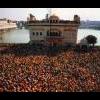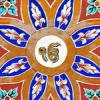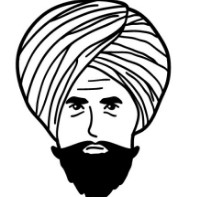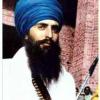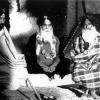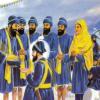Leaderboard
Popular Content
Showing content with the highest reputation on 07/10/2013 in all areas
-
Not necessarily a conspiracy; there might really be gays born into Sikh families who are terrfied of coming out... ...and before anyone tries to be clever, no, I'm not one of them, and this isn't a cry for help. :lol2:4 points
-
4 points
-
"In Ko Daras Satguru Ko darshan bolan Guru Shabad Gur Grantha. Dvadas Roop Satigur Eh Kaiyat Dvadas Bhan Pargat Har Santha. Partakya Kala Parbraham Dhanee Shai Granth Panth Khalsa Vartanta. Das Gobind Fateh Satgur Ki Khalsa Granth Gur Roop Bidanta" "Having the blessed audience (of the Khalsa) is equal to having the audience of the Guru, as long as they are singing the songs of love held within Guru Granth Sahib. There are twelve forms of the Guru this is what I (Guru Gobind Singh) tell you, There are twelve forms who revealed themselves I tell you Oh Saints. This is the blatant arrow of power dispensed by the ultimate Creator, Deal with the Guru Granth Guru Panth as the Khalsa. The slave of the Deathless Being, Guru Gobind Singh, (does not recognise this victory as his), the victory is of supreme true Guru, the Khalsa and the Granth, these are very form and presence of the Guru." Sarbloh Granth Sahib Ji3 points
-
I think waiting for 20-25 minutes to eat until after you finish your morning nitnem hardly qualifies for a fast. Fast is for hours and even days, a few minutes is not a fast. If today's Sikhs are so hungry that they cannot even wait for a mere 25 minutes until after Nitnem then what more can be said about our Panth's dilapidated state.3 points
-
The Khalsa Panth is Guru ROOP, not the Guru itself, similar to how the punj pyare are Guru roop. This makes sense b/c the Guru is one, and does not hold opinions or beliefs that contradict himself. But the panth has different groups in it with different beliefs. A self-contradicting Guru makes no sense. Additionally, there is a sakhi from the time of the jungs with the hill rajas. The Khalsa was crushing their armies when the Guru sent his messenger with the message to the Sikhs to turn back and cease the battle. The Khalsa ignored him thinking that they were so powerful and amazing and none could stand before them. Guru ji withdrew his kirpa and the Singhs were soundly defeated. Humbled they apologized, realising that all kirpa comes from the Guru. This sakhi shows that the panth, in and of itself, is not Guru, but rather a roop of the Guru through which the Guru can spread his kirpa and achieve his aims in the world.3 points
-
CONFERENCE IN EUROPEAN PARLIAMENT EXPOSES CONTINUED HUMAN RIGHTS ABUSES IN INDIA Sikhs from across Europe pass resolutions in the European Parliament calling for the: 1984 killing of Sikhs to be recognised as Genocide Abolition of the Death Penalty in India Immediate release of Professor Davinderpal Singh Bhullar An end to negotiations for the Free Trade Agreement between the EU and India due to continued human rights abuses in India Right of Sikhs to self-determination and to have their own independent Sikh homeland 26 June 2013 The Sikh Federation (UK) having previously organised numerous lobbies and meetings organised the first ever Sikh conference at the European Parliament on Tuesday 25 June. The subject chosen was Human Rights Abuses and the Death Penalty in India. Bill Newton Dunn a Liberal Democrat UK Member of the European Parliament (MEP) from the East Midlands and a member of the India Delegation hosted the 3-hour conference and welcomed Sikhs from a number of countries across Europe – UK, Italy, Germany, Belgium and the Netherlands. The conference was chaired throughout by Gurmel Singh of the Sikh Federation (UK). The conference was divided into four plenary sessions, but even before proceedings started MEPs such as Nigel Farage the leader of the UK Independence Party came to meet UK Sikhs and listen to their concerns. Others that met UK Sikhs in advance were Sajjad Karim a Conservative MEP from the North West who also joined Sikhs later in the conference and Glenis Willmott a Labour MEP from the East Midlands. Glenis was crucial in helping secure the right for Amritdhari Sikhs to wear the Kirpan in the European Parliament. This right was first fully exercised on mass in January 2013 and repeated yesterday with even larger numbers of Amritdhari Sikhs. The first session was about the June 1984 Sikh genocide and mass human rights abuses in Punjab by the Indian authorities and the November 1984 massacre of innocent Sikhs. The speakers for the first session were Jaspal Singh and Jaswinder Singh from the UK. A number of video clips were used throughout the conference to visually highlight different issues covered. Marina Yannakoudakis a Conservative MEP from London expressed a specific interest in learning more about the plight of Sikhs. The main speaker for the second session was Sukhvinder Singh from the UK. This session was about the death penalty in India, including the case of Professor Davinderpal Singh Bhullar and the reasons for Balwant Singh Rajoana’s actions. Several MEPs later spoke about their opposition to the death penalty. Sajjad Karim a Conservative MEP from the North West spoke about his opposition to the death penalty despite surviving the Taj Hotel attack in Mumbai in November 2008. He also said he was heavily involved in negotiations on behalf of the EU with India being the rapporteur on the free trade agreement between the EU and India and specifically requested evidence against Kamal Nath as continues to have direct dealings with him. The third session was about on-going human rights abuses of the Sikhs with reference to the illegal arrest and torture of political opponents Kulbir Singh Barapind and Daljit Singh Bittu; the unprovoked police murder of 18-year old Jaspal Singh in March 2012; the torture and police murder of 24-year old Shaminder Singh Shera and 17-year old Veer Singh in January 2011 and January 2012 respectively; and the death in police custody of Sohanjit Singh and Kulwant Singh and in March 2011 and February 2012 respectively. Jaspal Singh from the UK spoke about each of these cases and Dabinderjit Singh reiterated their present significance alongside the death penalty cases. The session was concluded by Maninder Singh from the UK who spoke about the True face of Indian democracy: Indian politicians facing criminal charges and failures in India’s judicial system. Numerous other MEPs contributed during the conference, including Edward McMillan-Scott the Vice President of the European Parliament for Democracy and Human Rights and Liberal Democrat MEP from Yorkshire and the Humber who later tweeted ‘Interesting Sikh Federation (UK) meeting in EU Parliament today to discuss rights of Sikhs in India and abolition of the death penalty’. Other MEPs that spoke included Jean Lambert a Green Party MEP from London and the Chair of the South Asia Delegation; Michael Cashman, a Labour MEP from the West Midlands; David Martin, a Labour MEP from Scotland; and Anthea McIntyre, a Conservative MEP from the West Midlands. Two MEPs from Italy also took part, Francesco De Angelis and Patrizia Toia. Around 15-20 assistants of MEPs attended the conference and Sikhs from the UK also met separately with MEPs such as Richard Howitt a Labour MEP from the Eastern region who was unable to attend the conference. Dabinderjit Singh from the UK presented the fourth and final session about justice delayed is justice denied and the right to self-determination as Sikhs have entered the 30th year since the June 1984 Indian army attack on the Golden Temple Complex. The session was concluded by Harjinder Singh speaking about identity discrimination in Belgium and the denial of Sikh human rights and difficulties in different European countries, such as France, Austria and Italy. This was also linked to the issue of Sikh self-determination and how a Sikh homeland would be of benefit to Sikhs throughout the Diaspora. The conference concluded with the reading of the five conference resolutions produced below. Sikhs present then passed these resolutions in the Sikh traditional manner of five loud Jakaaray of ‘Jo Bole So Nihal Sat Sri Akal’ - ‘Who so declares, Truth is Eternal, is blessed!’ Meaning - a declaration of allegiance to the Guru, and ultimately aligning oneself with the public struggle for truth and justice. These resolutions will now be translated into a number of different languages and taken forward at a national level by Sikhs with their MEPs. Gurjeet Singh National Press Secretary Sikh Federation (UK) Resolutions passed by Sikhs from across Europe at the Conference on Human Rights Abuses and the Death Penalty in India in the European Parliament on 25 June 2013 Resolution 1 – Recognising the 1984 Sikh Genocide Having regard to the Universal Declaration of Human Rights (1948), the Geneva Convention (1949), and the International Covenant on Civil and Political Rights (1966) recognises the events of June 1984, the mass human rights violations against the Sikhs in Punjab by the Indian authorities and the massacre of innocent Sikhs in November 1984 collectively as the 1984 Sikh Genocide and reiterates its concern and dismay as we enter the 30th anniversary of these events that India has failed to prosecute police officers, politicians and others responsible for this genocide. Resolution 2 – Abolish the death penalty in India Having regard to the European Parliament's Human Rights annual resolutions condemns recent executions by India after an eight year hiatus that run counter to the regional and global trends to abolish capital punishment; recognises the UN Special Rapporteur on extra judicial, summary or arbitrary executions conclusion on India that the death penalty is being imposed for a growing number of crimes; calls upon the Indian Government to put forward an immediate moratorium on the death penalty; reconsider the May 2012 recommendations of United Nations Human Rights Council related to the abolition of the death penalty and calls on the 27 Member States of the European Union, in particular the two permanent members of the UN Security Council, to collectively raise the need for India to abolish the death penalty at the earliest opportunity at the United Nations General Assembly. Resolution 3 – Release Professor Davinderpal Singh Bhullar Having regard to the European Parliament's July 2011 Resolution on India and the death sentence on Professor Davinderpal Singh Bhullar, Article 2 of the Charter of Fundamental Rights of the European Union, EU Guidelines on the Death Penalty, the EU-India Dialogue on Human Rights, Amnesty International calls on 12 April 2013 for the Professor’s death sentence not to be carried out, to remove him from death row immediately and retry his case in proceedings that comply with international fair trial standards; observes the inconsistent approach by the Supreme Court of India who in the case of Mahendra Nath Das on 1 May 2013 granted clemency on the grounds of inordinate delay as his mercy petition against his execution was kept pending by the President, but two weeks earlier rejected a similar petition filed by Professor Bhullar who waited for eight years for a decision by the President; reiterates its concern that recent independent medical reports commissioned by the Indian authorities regarding the Professor’s mental and physical health suggest that on compassionate and moral grounds his death sentence should be commuted; further urges India to release the Professor without further delay given he has spent more than 18 years in prison following a controversial conviction where M B Shah, the Presiding Judge in the Supreme Court had acquitted the Professor based on the evidence presented; recognises this has become more pressing given the unprecedented move by the special public prosecutor, senior advocate Anoop G Chaudhari, who had appeared against the Professor in the Supreme Court in 2002 to state in April 2013 that a judicial error had been made in awarding the death sentence against the Professor and S S Virk, the former Director General of Punjab Police stating in May 2013 that the Professor was not guilty of what he was being accused of and he deserves justice as he and his family have been wronged. Resolution 4 – Continued human rights violations in India and the Free Trade Agreement between the EU and India Having regard to the Universal Declaration of Human Rights (1948), the EU Guidelines on Human Rights Defenders and the Charter of Fundamental Rights of the European Union is deeply concerned about the continued human rights violations in India against the minority Sikh community; calls on the Indian Government to prosecute police officers responsible for torture, disproportionate and excessive use of force, illegal detention and extra-judicial killings of Sikhs, calls on the international community to prosecute those in India responsible for war crimes and crimes against humanity and calls on the European Commission to end the negotiations with the Government of India for the creation of the Free Trade Agreement between the EU and India. Resolution 5 – Unquestionable right of Sikhs to self-determination and to have their own independent Sikh homeland Having regard to Articles 1, 55 and 56 of the Charter of the United Nations and the International Covenant on Civil and Political Rights (1966); objects to India’s continued reservation to the right to self-determination and applauds the objections raised by France, Germany and the Netherlands against India’s reservation to reiterate self-determination applies to all people; stresses India has also lost the right to argue the limitation of territorial integrity with regards to Sikhs as the Indian State when it enacted its first Constitution in 1950 it failed to deliver any safeguards or political rights for the Sikhs as a people or nation and has oppressed the Sikhs and other minorities through gross human rights violations; recognises the unquestionable right of Sikhs to self-determination and to have their own independent Sikh homeland; stresses that peaceful and non-violent means are the only way to achieve a just and lasting peace between Sikhs and the Indian State, calls for direct talks between the International Coalition for a Sikh Homeland and the Indian State; and calls on the Council, the Commission and EU Member States to support and deliver assistance to Sikh institutions and development projects with the aim of protecting and strengthening the Sikh population.2 points
-
What you are talking about is from the following on wikipedia: "According to Bhai Man Singh's Pothi Janam Sakhi (late 18th century), Guru Nanak Dev visited Ayodhya and said to his Muslim disciple Mardana: 'Mardania! eh Ajudhia nagari Sri Ramachandraji Ji ki hai. So, chal, iska darsan kari'e. Translation: 'Mardana! this Ayodhya city belongs to Sri Ramachandra Ji. So let us go for his darshan (visit the god)." The above is taken from this following passage: "When we reach back in time, what we find particularly interesting are the accounts attributed to Guru Nanak. He was a contemporary of Babar, and an eyewitness to his vandalism. Nanak condemned him in the strongest terms. Harsh Narain writes (pp 14-15): Guru Nanak, according to Bhai Man Singh's Pothi Janam Sakhi, said to have been composed in 1787 Anno Vikrami/1730 A.D., visited Ayodhya and said to his Muslim disciple Mardana: 'Mardania! eh Ajudhia nagari Sri Ramachandraji Ji ki hai. So, chal, iska darsan kari'e. Translation: 'Mardana! this Ayodhya city belongs to Sri Ramachandra Ji. So let us have its darsana.' This indicates that Nanak visited Ayodhya shortly before the destruction of the Rama temple by Babar. Man Singh's book was written two hundred years later, which means that he was drawing upon existing traditions or some other source relating to Nanak's visit to Ayodhya. But another work by Baba Sukhbasi Ram gives a similar account, again suggesting that Nanak visited Ayodyha before the temple was destroyed by his contemporary, the invader Babar whose atrocities he condemned. 'These kings are nothing but butchers' said Nanak, refering to the Moghuls and others in his time." Here is some more information: AYODHYA (26° 45`N, 82° 10`E), on the right bank of the River Saryu, also known as Ghaghara, is sacred to the Hindus as the birthplace of Lord Rama. This ancient town has Sikh shrines in memory of the First, the Ninth and the Tenth Gurus. All three are located within 50 metres of each other near Brahma`s Tap Sthan (Brahma Kund) on Saryu bank, and are collectively called Gurdwara Brahmakund. The memorial commemorating Guru Nanak`s visit at the beginning of the sixteenth century consists of only a Sikh flag on a platform constructed in 1972. Guru Tegh Bahadur visited Ayodhya in 1670 while on his way back to the Punjab from the eastern parts. It is said that after offering obeisance at the then existing shrine of Guru Nanak he sat near by in meditation continuously for 48 hours. Before he left, the Brahman priest serving the shrine made a request for a keepsake, and the Guru left his wooden sandals with him. The pair is still kept in Gurdwara Guru Gobind Singh Ji. A platform was raised on the site in memory of Guru Tegh Bahadur`s visit. A room was constructed over it by the Sikh troops of Faizabad cantonment in 1975.The Guru Granth Sahib is ushered in only on the occasion of the chain of 51 Akhand Paths held here commencing from Assu sudf 1 and concluding on Maghar sudf 5 to honour the martyrdom anniversary of Guru Tegh Bahadur. Guru Gobind Singh passed through Ayodhya when, as a child, he was travelling from Patna to Anandpur. A platform was raised to commemorate the visit. This, like the other two shrines, was looked after by Brahman priests till about the middle of the nineteenth century when Baba Gulab Singh, a Kashmiri Sikh, came and occupied the site. The present building was constructed in 1899. It commands a panoramic view of a landscape sprawling beyond the lazily flowing Saryu River. The central domed room, octagonal in shape and with a marble floor, is called Singhasan Sthan (Throne Room) Guru Gobind Singh Ji. The Guru Granth Sahib is seated in a rectangular room in front of it. The relics preserved in the Singhasan Sthan include, in addition to the pair of sandals left by Guru Tegh Bahadur, an allsteel arrow, a katar (dagger), and a chakra (quoit). There are also two handwritten volumesa copy of the Guru Granth Sahib transcribed in 1838 Bk/AD 1781 and a copy of the Dasam Granth. References : 1. Thakar Singh, Giani, Sri Gurduare Darshan. Amritsar, 1923 2. Tara Singh, Sri Gur Tirath Sangrahi. Amritsar, n.d Here is some more information: Gurudwara Guru Gobind Singh Ji - Ayodhya on the right bank of the River Saryu, also known as Ghaghra, is a noted pilgrimage centre for the Hindus because it has the honour of being the native place and capital of Lord Rama. It is a railway station on the Lucknow-Faizabad-Mughal Serai section of the Northern Railway and is also connected by road to the district town Faizabad, only six kilometres away. Guru Nanak Dev, Guru Tegh Bahadur and Guru Gobind Singh (as a child) visited Ayodhya at different times. There are three Sikh Shrines here, all in a cluster, near Brahm Kund on the bank of Saryu. The one dedicated to Guru Nanak Dev is only a Nishan Sahib fixed on a platform constructed in 1972. Memorial to Guru Tegh Bahadur's visit, too, was only at platform until 1975, when Sikh troops of Faizabad Cantonment built a room over it. Guru Granth Sahib is seated here only during a series of akhand paths concluding on the martyrdom anniversary of Guru Tegh Bahadur. The Shrine dedicated to Guru Gobind Singh was also only a Thara Sahib to begin with, and all the three Shrines were looked after by Brahman priests until the arrival here of a Kashmiri Sikh, Gulab Singh about the middle of the nineteenth century. He occupied the Shrines and later constructed Gurdwara Guru Gobind Singh Ji in 1899 on the site of the platform dedicated to child Gobind Das. An octagonal domed room is named Singhasan Sthan (lit. throne) Guru Gobind Singh Ji. It encloses the former platform on which are placed the sacred relics - i.e. a pair of sandals believed to be once worn by Guru Tegh Bahadur, a steel arrow, a dagger and a chakar (steel quoit with sharp outer edge). There is also a hand-written copy of the Holy Scripture dated 1838 Bikrami (A.D. 1781) . There are few Sikhs in Ayodhya, but Sikh soldiers from Faizabad visit usually on Sundays and other gurpurbs. Also more information: The Ranopali Nanakshahi Temple—one of the oldest temples of the Udaseen sect. The Ranopali Nanakshahi Temple, located on the outskirts of Ayodhya, is the main ashram of the Udaseen sect. According to tradition, this sect was founded in the seventeenth century by Shri Chand, the eldest of the two sons of Guru Nanak, the founder of Sikhism. Also more information: Gurudwara Brahmakund Sahib/Brahm KundOn Chaudah Koshi Parikrama Marg, near Brahma Kund, in the west side of Ayodhya, district Faizabad, U.P., India Brahma Kund area has been described as the meditation place of Lord Brahma in Brahma Puran & other Puranas as well. Earlier this place was known as Tirtharaj but after the penance of Brahma this place came to be known as Brahma Kund. Guru Nanakdev Ji visited this place in 1557 Vikrami. He also sermonized local pandits here and since then the construction of Gurudwara was initiated here. Ninth Sikh Guru, Guru Teg Bahadur also came here in 1725 Vikrami and left his footwear here, which can be seen in the present building of Gurudwara even today. Tenth Guru of Sikhs Guru Govind Singh paid obeisance here while proceeding to Anandpur Sahib from Patna Sahib. His three weapons- arrow, dagger, chakra & Sunahali Beed- manuscript of Adi Beed Sahib written in 1838, are also kept in this Gurudwara.2 points
-
when it quacks like a duck it's a duck..hehe..watch out..be alert on shoulders bro, be very very alert everywhere- there are plenty of panthic police with their nikon cameras carrying around everywhere these days to do their panthic duty. if i ever come across with them, i will sing hare rama , hare krishna with my hairs out just to piss them off even more heheh...jk2 points
-
A Rehitvaan Singh will not do this, because he will remember at that time the puraatan Singhs who could have had all the comforts of life but didn't, because following Guru's rehit was more important for them than worldly comforts, so a rehitvaan Singh will not mind waiting for a mere 25 minutes until his morning nitnem is over and he can eat all he wants. How many times have we as youngsters been in class and wanting to eat food but weren't allowed to eat or drink by the teacher until the class is over? yet that didn't stop us from focusing on our studies, similarly during meditation and doing Paath our mind will try to distract our attention in all directions whether it is outside noise or the thought of some tasty food. One who controls their mind at that moment of weakness will further improve his abhyaas and get Chardikala while those who cannot wait for a few minutes longer their spiritual progress will remain in Khardikala(stand still).2 points
-
That principle is well understood, nothing wrong with the principle itself but what can turned that principle into dogma is if person having thoughts while doing ishnan and or during morning nitneem about food because of hunger or whats being cooked while reciting gurbani..again nothing wrong with principle itself - its the people who can turn the principles into dogma not principles itself turning into dogma- i think thats a key difference here and thats where missionaries are dead wrong as they have knee j erk reaction and reject the rituals/principles all together rather than discussing dogmatic mindset of individual than rituals/principles itself. In my opinion, If one is hungry while they do nitneem in the morning/evening there are two things one can do depending on individual case for the sake of/upholding the concentration during nitneem - a) totally ignore the thought of hunger, concentrate on whats being read..one will notice by ignoring the thoughts and after a minute or so thought of being hungry will disappear itself or b) depending on person state of mind, if hunger is too point, one cannot concentrate on nitneem there is no hurt of taking a bite or two (Gurparsad bhram na nash- Guru Maharaj know our intentions and maharaj sitting inside all of us certainly not a christian version of wrathful vahiguroo) go back upstairs continue with nitneem..its simple. Sikhi in essence is above any bhrams.2 points
-
2 points
-
So it's not Justice delayed is justice denied...... It's just Justice Denied, period!! What a disgrace and a travesty.2 points
-
First of all I don't the question by the OP. The only reason I can think of a Sikh undertaking the Ramadan fast and thereby going against the teachings of the Gurus is that he/she has brought into the propaganda of Muslims that is everywhere during Ramadan. There is going to be a programme on Channel 4 about how great Ramadan is. The usual propaganda, how it';s a spiritual MOT! How it makes them think about the starving blah blah blah, Most of it is BS. Muslims fast because they have to, otherwise they get shunned by other Muslims. I would be weary of all those reports that majority of Muslims fast, I am sure a lot of them have a sneaky snack out of sight from other Muslims. If you cut through the propaganda, you will realise that Ramadan is not really a fast at all. Most Muslims stuff their faces before sunrise and then again after sunset. It is more of a change of eating habits, changing from three small meals throughout the day to two big meals at the start and end of the day. In most Muslim countries the restaurants and food outlets have to close down during the daylight hours. Non-Muslims can be beaten up and arrested if they eat anything in public because this will offend Muslims!2 points
-
First of all, Sikhi preaches against fasting as it has no spiritual significance. Sikhi is a practical religion. Fasting in Ramadan signifies that they fast because there are so many people who can't afford food and they want to feel their suffering whereas in Sikhi we have concept of Seva where we help those poor and needy people so that they don't have to go through that suffering... Anyways, I never get the point of fasting as they eat after sunset and before sunrise whereas those poor people don't have that privelage... Rest is up to you. Personally, I would suggest you to help feed some homeless and needy during this month than starving yourself2 points
-
ਤੀਰਥ ਵਰਤ ਸੁਚਿ ਸੰਜਮੁ ਨਾਹੀ ਕਰਮੁ ਧਰਮੁ ਨਹੀ ਪੂਜਾ ॥ Pilgrimages, fasts, purification and self-discipline are of no use, nor are rituals, religious ceremonies or empty worship. ਨਾਨਕ ਭਾਇ ਭਗਤਿ ਨਿਸਤਾਰਾ ਦੁਬਿਧਾ ਵਿਆਪੈ ਦੂਜਾ ॥੨॥ O Nanak, emancipation comes only by loving devotional worship; through duality, people are engrossed in duality. ||2||2 points
-
Waheguru Ji Ka Khalsa! Waheguru Ji Ki Fateh! Sure ji , will do so PS:- dont tell waheguru how big your worries are!! tell worries how big your waheguru is!! all is hukam , have faith2 points
-
Are these anti gurmat? http://www1.pictures.stylebistro.com/gi/Charl+Schwartzel+Casual+Hats+Sun+Visor+jP8JtWtXwd9l.jpg1 point
-
Is their a big difference between Sikhs or Asians as a whole in the North of England and the South? Having been to various cities across the UK. I Find that the Asians in the North are a lot more traditional with keeping with their culture and religion. especially in places like Birmingham. But in London and the South they are more westernized. I find places like Manchester, where there are hardly any Sikhs and the Muslims down there don't even resemble 'Asian' but look more Arabic/Moroccan descent.1 point
-
gurfateh g i noticed something there are so many questions here that would be answered just by consulting gurbani ask sant kabeer ji who talks about this directly Alhu ek masīṯ basaṯ hai avar mulakẖ kis kerā. If the Lord Allah lives only in the mosque, then to whom does the rest of the world belong? Hinḏū mūraṯ nām nivāsī ḏuh mėh ṯaṯ na herā. ||1|| According to the Hindus, the Lord's Name abides in the idol, but there is no truth in either of these claims. ||1|| Alah rām jīva▫o ṯere nā▫ī. Keval nām japahu re parānī ṯab hī nihcẖai ṯarnā. ||6||2|| Chant the Naam, the Name of the Lord, O mortals, and you shall surely be carried across. ||6||2|| O Allah, O Raam, I live by Your Name. Ŧū kar mihrāmaṯ sā▫ī. ||1|| rahā▫o. Please show mercy to me, O Master. ||1||Pause|| Ḏakẖan ḏes harī kā bāsā pacẖẖim alah mukāmā. (people say) The God of the Hindus lives in the southern lands, and the God of the Muslims lives in the west. Ḏil mėh kẖoj ḏilai ḏil kẖojahu ehī ṯẖa▫ur mukāmā. ||2|| So search in your heart - look deep into your heart of hearts; this is the home and the place where God lives. ||2|| Barahman gi▫ās karahi cẖa▫ubīsā kājī mah ramjānā. The Brahmins observe twenty-four fasts during the year, and the Muslims fast during the month of Ramadaan. Gi▫ārėh mās pās kai rākẖe ekai māhi niḏẖānā. ||3|| The Muslims set aside eleven months, and claim that the treasure is only in the one month. ||3|| Kahā udīse majan kī▫ā ki▫ā masīṯ sir nāʼn▫eʼn. What is the use of bathing at Orissa? Why do the Muslims bow their heads in the mosque? Ḏil mėh kapat nivāj gujārai ki▫ā haj kābai jāʼn▫eʼn. ||4|| If someone has deception in his heart, what good is it for him to utter prayers? And what good is it for him to go on pilgrimage to Mecca? ||4|| Ėṯe a▫uraṯ marḏā sāje e sabẖ rūp ṯumĥāre. You fashioned all these men and women, Lord. All these are Your Forms. Kabīr pūngrā rām alah kā sabẖ gur pīr hamāre. ||5|| Kabeer is the child of God, Allah, Raam. All the Gurus and prophets are mine. ||5|| Kahaṯ Kabīr sunhu nar narvai parahu ek kī sarnā. Says Kabeer, listen, O men and women: seek the Sanctuary of the One. Keval nām japahu re parānī ṯab hī nihcẖai ṯarnā. ||6||2|| Chant the Naam, the Name of the Lord, O mortals, and you shall surely be carried across. ||6||2|| wahgroooo look at those strong words not a sense of duality here at all wahgroo wahgroo wahgroo dhan wahgrooo but if thats not enough to convince you of the vishaal path our Guru Sahibaan gave us read this varaṯ na raha▫o na mah ramḏānā. I do not keep fasts, nor do I observe the month of Ramadaan. Ŧis sevī jo rakẖai niḏānā. ||1|| I serve only the One, who will protect me in the end. ||1|| just go to srigranth.org and search the word fast why debate gurmat like this when guru sahib has a clear answer1 point
-
This so-called 'gay Sikh', how much of a Sikh is he in the first place? Nowadays people think just being born into a supposedly Sikh (i.e. typical Panjabi) family automatically makes you a Sikh, but this couldn't be further from the truth. Sikhi must be earned, it cannot be inherited. And a true Sikh would realise that homosexuality is not compatible with a Gursikhi jeevan. I have no problem with gay/straight/bisexual people, they are free to do as they please. But I do have an issue with those who try to twist Sikh teachings and Gurbani to suit their own agenda. The Twitter account holder wrote "if it was condemned, it'd also be in the bani, but there's no reference at all", firstly just look at the way he referred to Sri Guru Granth Sahib Ji, he calls Guru Ji "the bani". It makes me wonder, he is making a song and dance about being a 'gay Sikh' but how in tune is he with the message of Gurbani and Sikhi, if he cannot even refer to Guru Ji in the correct, respectful manner. Also, Sri Guru Granth Sahib Ji is not a rule book which contains edicts on all the topics under the sun. Gurbani teaches us how we should live our life, and forms the basis of our Rehat Marayada which clearly states that "A Sikh man and woman should enter wedlock without giving thought to the prospective spouse's caste and descent." There is no mention of a Sikh woman and woman entering wedlock, or a Sikh man and man entering wedlock- just a Sikh woman with a Sikh man. The only relationship permitted is that between a Sikh man and woman, which would be solemnized via an Anand Karaj. The Anand Karaj is the starting point of a grisht jeevan. If your relationship/marriage cannot be solemnized via an Anand Karaj, then it is not recognised by Guru Ji, and the last time I checked, homosexuals were not permitted to have an Anand Karaj in a Gurdwara.1 point
-
ਜੇ ਕੋ ਓਸ ਦੀ ਰੀਸ ਕਰੇ ਸੋ ਮੂੜ ਅਜਾਣੀ ॥ One who tries to compete with Him is a senseless fool __________________ ਮੂਰਖੁ ਹੋਵੈ ਸੁ ਉਨ ਕੀ ਰੀਸ ਕਰੇ ਤਿਸੁ ਹਲਤਿ ਪਲਤਿ ਮੁਹੁ ਕਾਰਾ ॥੨॥ Anyone who tries to compete with them is a fool; his face shall be blackened here and hereafter. ||2|| __________________ ੴ ਸਤਿਗੁਰ ਪ੍ਰਸਾਦਿ ॥ One Universal Creator God. By The Grace Of The True Guru: ਸੂਹੀ ਮਹਲਾ ੫ ਘਰੁ ੩ Soohee, Fifth Mehl, Third House: ਸੇਵਾ ਥੋਰੀ ਮਾਗਨੁ ਬਹੁਤਾ ॥ His service is insignificant, but his demands are very great. ਮਹਲੁ ਨ ਪਾਵੈ ਕਹਤੋ ਪਹੁਤਾ ॥੧॥ He does not obtain the Mansion of the Lord's Presence, but he says that he has arrived there||1|| ਜੋ ਪ੍ਰਿਅ ਮਾਨੇ ਤਿਨ ਕੀ ਰੀਸਾ ॥ He competes with those who have been accepted by the Beloved Lord. ਕੂੜੇ ਮੂਰਖ ਕੀ ਹਾਠੀਸਾ ॥੧॥ ਰਹਾਉ ॥ This is how stubborn the false fool is! ||1||Pause|| ਭੇਖ ਦਿਖਾਵੈ ਸਚੁ ਨ ਕਮਾਵੈ ॥ He wears religious robes, but he does not practice Truth. ਕਹਤੋ ਮਹਲੀ ਨਿਕਟਿ ਨ ਆਵੈ ॥੨॥ He says that he has found the Mansion of the Lord's Presence, but he cannot even get near it. ||2|| ਅਤੀਤੁ ਸਦਾਏ ਮਾਇਆ ਕਾ ਮਾਤਾ ॥ He says that he is unattached, but he is intoxicated with Maya. ਮਨਿ ਨਹੀ ਪ੍ਰੀਤਿ ਕਹੈ ਮੁਖਿ ਰਾਤਾ ॥੩॥ There is no love in his mind, and yet he says that he is imbued with the Lord. ||3|| ਕਹੁ ਨਾਨਕ ਪ੍ਰਭ ਬਿਨਉ ਸੁਨੀਜੈ ॥ Says Nanak, hear my prayer, God: ਕੁਚਲੁ ਕਠੋਰੁ ਕਾਮੀ ਮੁਕਤੁ ਕੀਜੈ ॥੪॥ I am silly, stubborn and filled with sexual desire - please, liberate me! ||4|| ਦਰਸਨ ਦੇਖੇ ਕੀ ਵਡਿਆਈ ॥ I gaze upon the glorious greatness of the Blessed Vision of Your Darshan. ਤੁਮ੍ਹ੍ਹ ਸੁਖਦਾਤੇ ਪੁਰਖ ਸੁਭਾਈ ॥੧॥ ਰਹਾਉ ਦੂਜਾ ॥੧॥੭॥ You are the Giver of Peace, the Loving Primal Being. ||1||Second Pause||1||7|| ______________________ ਕੀਤਾ ਹੋਵੈ ਸਰੀਕੀ ਕਰੈ ਅਨਹੋਦਾ ਨਾਉ ਧਰਾਇਆ ॥ The created being tried to compete with his Creator, but he assumed this name in vain. ______________________ ਮਃ ੧ ॥ First Mehl: ਗਲੀ ਅਸੀ ਚੰਗੀਆ ਆਚਾਰੀ ਬੁਰੀਆਹ ॥ We are good at talking, but our actions are bad. ਮਨਹੁ ਕੁਸੁਧਾ ਕਾਲੀਆ ਬਾਹਰਿ ਚਿਟਵੀਆਹ ॥ Mentally, we are impure and black, but outwardly, we appear white. ਰੀਸਾ ਕਰਿਹ ਤਿਨਾੜੀਆ ਜੋ ਸੇਵਹਿ ਦਰੁ ਖੜੀਆਹ ॥ We imitate those who stand and serve at the Lord's Door. ਨਾਲਿ ਖਸਮੈ ਰਤੀਆ ਮਾਣਹਿ ਸੁਖਿ ਰਲੀਆਹ ॥ They are attuned to the Love of their Husband Lord, and they experience the pleasure of His Love. ਹੋਦੈ ਤਾਣਿ ਨਿਤਾਣੀਆ ਰਹਹਿ ਨਿਮਾਨਣੀਆਹ ॥ They remain powerless, even while they have power; they remain humble and meek. ਨਾਨਕ ਜਨਮੁ ਸਕਾਰਥਾ ਜੇ ਤਿਨ ਕੈ ਸੰਗਿ ਮਿਲਾਹ ॥੨॥ O Nanak, our lives become profitable if we associate with them. ||2||1 point
-
Sant Baba Attar Singh ji Mastuana Sahib:- "Kise da bol kabol saharna, tapaa sir tap hai"1 point
-
One thing people here need to understand that Sikhs have a long history in Canada. Sikhs have contribute a lot to Canada over 100 years now which makes it easier for Sikhs to take pride of being Canadian compare to other South Asians in Canada. Of course, this doesn't mean we're ignoring our Sikh identity, but we're also Canadian as well. Being Canadian is our identity too. LegalSingh: It's great you're Londoner and you're Sikh first than anything else (like we all here), but it doesn't mean we can't take pride countries we live in where we can practice our religion freely not worry about being killed like in India. Yes, Canada isn't biggest player in the world, but it doesn't mean they're lightweight either. Like I said in my previous post, Canada is G8 nation with a lot of resources that other countries would kill to have in their countries. There's a reason why EU wants to come up with free trade agreement with Canada instead of Australia while China is trying to buy up all our resources in this country. I personally understand why Sikhs in UK don't take pride being British/English given what they did to our people and how they stole our land to give to Hindus and Muslims in the end. So I completely understand why Sikhs shouldn't take pride of being British/English.1 point
-
waheguru ji ka khalsa waheguru ji ki fateh sadh sangat ji these days daas had summer holidays and so with maharaj's kirpa thought of doing simran and path in amritvela...daas is able to wake up on time at almost 3 and able to sit for path at 3:30 with blessings but when he starts to do path he is able to finish sri japji sahib and in between sri jaap sahib till harbolmana chand he is fully exhausted and his stomach starts to growl and he feels that if he would continues then he is gonna get fainted...he feels very bad about it.... plz bless him that how he can do path in morning empty stomach....1 point
-
1 point
-
drink a glass of water veer, it helped me..like the stomach cools down for sometime..1 point
-
There is nothing stopping these Hindus in tackling the Islamic terror themselves, the Hindu population around the world is in excess of 1 billion? Us Sikhs only owe it to ourselves now to get back to the orginal message of the Sikh Gurus & Bhagats, to expunge the curse of casteism, materialism, girl foeticide, etc. etc. from our community and recreate the glory of the Khalsa where the rest of mankind should learn from our example. Long Live The Khalsa!1 point
-
Wait, lets be clear here, waking up at Amritvela to do Ishnan and Nitnem then eating is not the same at the ritual fasting of the Muslims and Hindus. I don't understand how one can compare the two. Just follow Sikhi and you will get Chardikala. A Sikh who does spiritual flirting with other religions is like the woman who despite being married does flirting with other men. Such a person is not Ghar ka na Ghaat ka.1 point
-
1 point
-
1 point
-
A Sikh is suppose to eat after doing Ishnan and morning nitnem, It's called following Rehit. That's not the same as doing the ritualistic Ramadan fast of Muslims or the fasts that Hindus do.1 point
-
Whatever it is yaar, I seriously miss Ramadan in Dubai, the way it used to be when I was in high school. 5 hours of work/school, late night favorite Hindi movies on local channels, shopping frenzy all over the city, 2 AM traffic jams, etc. etc. We would eagerly wait for it because that was the 1 month of the year when non-Muslims would have a lot lot more fun than Muslims, LOL, no kidding! What I do NOT miss is the excessive religious programs on TV throughout the day (yes, these were followed by the Hindi movies LOL, ironic huh?), the apprehension of chewing gum on the road and getting arrested/slapped by a frustrated/starving cop etc. Top of all, I definitely do NOT miss the unbearable stench from their mouths as a result of having eaten all night and then NOT brushing their teeth, since, according to one of my dad's colleagues "You know sir, the more bad smell comes from your mouth during Ramadan, the closer you are to Allah" (I swear I am NOT kidding).1 point
-
1 point
-
WaheguruJiKaKhalsa!!WaheguruJiKiFateh!! Giani inderjit singh ji explains in Sri Nanak Prakash katha the following are our Baba GuruNanak's teachings Santhok in eating , is our forever fast. do not go for food that make ur rasna wander , spicy,delicious,tasty, eh rasna tun ann ras rach rahi teri pyaas na jaye santhok in wearing clothes santhok in asking for fruit of meditation/sewa from Akall Always recognise everything is hukam and thank that allmighty akal this is a sikhs fast1 point
-
Muslims only have to give one fourth of what Sikhs give as daswand = 2.5% of yearly profits for a business. Sikhs have to give their daswand to those who need it most regardless of what their faith or background is. Muslims can only give charity to other Muslims according to the rules that Prophet Muhammad set.1 point
-
And teach them some Gatka or any other martial arts as well, so that next time a malesh sees a Sikh bibi, he tells himself "tauba tauba! Sikh ladki! Khuda rehem kare!"1 point
-
Newly blessed Amritdharis from Mathaana, Madhya Pradesh! DHANN HAI TU DHANN DHANN DHANN KHALSA!!!!!1 point
-
It may be mentioned that the Akali Dal had promised in its manifesto for the 1997 Assembly elections to order judicial probe into militancy which might have investigated this aspect also. However, Badal later backtracked from this promise. Rather several of the police officials whose names used to be linked to fake encounter and state repression came to be the favorites of the Badal government. - See more at: http://www.punjabnewsline.com/news/confession-on-fake-encounters-by-police-official-fails-to-create-stir-in-punjab/82305#sthash.dMHpYTwP.dpuf1 point
-
1 point
-
Very few Sikhs were part of the army that attacked Sri Darbar Sahib. The Indian army could just get a few so called traitor Sikhs like Brar, Dyal as a show for the world, and say to them "see even Sikhs supported operation bluestar." Most of the Sikh soldiers were brought in after the attack for the purpose of cleaning up the blood. Thousands of Sikhs mutinied during the attack and were trying to make their way to Punjab. Unfortunately, since they were already moved to far off locations away from Punjab they could not reach Punjab to do anything. These soldiers were disorganized and were later caught, some were tortured and the rest were suspended.1 point
-
Sant Baba Attar Singh ji Reru Sahib:- "Hirde di shudhi, waheguru de milaap da asli saadhan hai"1 point
-
Sikhs didn't do this. The enemies of Sikhs did this to give the Panth a bad name. Sikhs protect Mandirs and Masjids instead. Sikhs never mark baseball bats with Gurbani because that would be Beadbi.1 point
-
Sant Baba Balwant Singh ji Urmur Tandewale:- jeonde mar jaida, sewa kamauni aukhi.......... tavian te asan launa painda, tatta ret pavauna penda, oh naio ghabraida, sewa kamauni aukhi jeonde mar jaida, sewa kamauni aukhi aare naal sir chirvauna painda, band band katvauna painda, taain charkharhi charh jaida, sewa kamauni aukhi jeonde mar jaida, sewa kamauni aukhi neenha vich laal chanaune painde, tind de sraane laune painde, oh fir vi shuker manaida, sewa kamauni aukhi jeonde mar jaida, sewa kamauni aukhi1 point
-
Excerpt of teachings to Sant Isher Singh ji Rarha sahibwale by Sant Attar Singh ji Reru sahib:(adhikari layi bachan) Naam japan wale nu kai gallan da dhyaan rakhna jaroori hai. oh kise bhekh te koi tarak ya nafrat na kare. Chahe oh hindu hai, muslim, chahe sikh ya isaayee. Rasta bhawein vakh-vakh hai par rab sabhna da iko-ik hai, kyonki: "Mazhab na koi rab da, banda kare ijaad, Oh nazdeek khudaaye de, jo rakhan usnu yaad" fer kai sadhu daane, deewane te mastane hunde han. Koi tamoguni, kise vich sato gun adik hunda hai. Jiwein satguran furmaya hai: "birkhe heth sabh jant ikathe, ik tate, ik bolan mithe" - ang 1019 par advaitwadi sabh naal milaap rakhe, tusin is sansar vich bhaant-bhaant de log, sabh ral mil ke chaliye. Mat apne vich neshti howe, milaap har-ik naal rakhe, ki pata parmesher nu kisdi kireya bhaundi hai: "ik bhaye dekho sabh naari, kya jaano seh kaun pyari" - ang 327 Baadshah diyan beant raania hundia han, par raaj da maalak useda puttar banda hai, baadshah di jis upar pooran prasanata(khushi) howe. Ise taran, parmeshaer vi anderle pyar nu dekhda hai, bhekh te nahin reejhda. So har ik naal prem karna saadhu da mukh dharam hai: "tulsi is sansar mein sabhko miliye dhaaye, na jaano kis bhekh mein, narayan mile aaye"1 point
-
Sant Baba Attar Singh ji Reru Sahib:- "par-upkar de smaan koi punn nahin"1 point
-
Sant Baba Attar Singh ji Reru Sahib:- When Sant Baba Aaya Singh ji Hoti Mardanwale left the panj bhootak chola, sangat (fauji) was directed to Sant Attar Singh ji Reru Sahib by akaal purkh ji's hukum. Sangat had never done darshan of Sant ji. So when they reached reru sahib, they were told that Sant ji "khetan vich hal vaa rahe ne". Sangat on their way to fields started doing shanka/doubts on Sant ji by saying that Sant mahapurkh should not do this, they should just sit and give darshan to sangat, etc. Sant ji, antarjami, knew what was in their minds, so sant ji went to them and said Sant ji is in the kutiya and sangat was directed towards a cottage nearby. When they reached there they saw the same Baba ji, with illahi noor, chita rang, chita darha and said babaji you r the same who met us on way. After confirming they asked how did you get here before us, even took bath and changed clothes. Sant ji first tried to avoid this as thes are gupt khedan. But on insisting did following bachans after explaining the importance of sewa:- "Tusin rabbi hukum anusaar, itni dooron chalke vi aaye, jekar tuahdi eh tush jehi mang vi poori na hundi, fer shardha nahin si rehni. Shardha ton bina sikh nu sadhu darshana da pooran labh nahin milda. par bai, sadhu da ant laina vi theek nahin, shardha rakh ke jitna ho sake sadhu di sewa kariye, ona di parikheya nahin karni chahidi, bhala je ansi hun tuhadi parkh kariye, ta koi kaswati te poora uter sakega?" Sangat apologized. Baba ji again said: Gursikho, shardha waleaan de berhe paar hunde han. Bhagti roop brish laun layi, shudh hirda dharti hai, nimrata roopi jal te shardha hi beej hai. Eh hal wahun di sewa vi daate paason mang ke layi hai, pyare ne tuth ke eh daat bakhshi hai."1 point
-
sorry to bother but i am unable to update any status...can u check what the problem is? anyways there is no rush..just do it when u feel like thanks.1 point
-
Sant Baba Balwant Singh ji Tandewale:- "Kade na kaho meri sas marhi, meri nanaan marhi, hamehsa kaho ke mere karam maarhe ne" "Never say my mother-in-law or sister in law is bad, always say that my karams are bad"1 point
-
Sant Gurdial Singh ji Tandewale:- "Dharam jazbaatan da khed hai"1 point
-
Dhan Dhan Baba Nand Singh ji :- "Naam japna aukha vi hai te saukha vi"1 point





